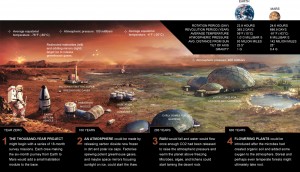
The colonization of the planet Mars will not be a quick process despite movies like Red Planet that displayed a terraforming method that used algae to create oxygen in the atmosphere. That could work, but it would not be a very fast process. With the recent announcement of plans for asteroid mining sometime in the future, a base on Mars would be necessary for such a long journey to the asteroid belt. it would be easier to travel to Mars, although the asteroid belt is not much further, the amount of radiation the crew would be exposed to is too much for survival. Using robot craft to make the journey and mine minerals from the asteroids is the only sane way to accomplish this feat. A nuclear powered spacecraft like Project Orion or Daedalus would be able to make the journey, but it would still take a long time. Traveling to Mars is only possible with adequate shielding for any human crew.

I am not sure about the mining of the asteroids, the technology required may not exist yet. A news announcement such as this will help to rekindle interest in space travel. If there actually were people that far out in space, it would be interesting to look up at the sky at night and know that they were way out there and toiling away on their mining missions. Interest in space travel has waned of late, it needs to be brought back to the forefront. I have written quite a bit about space travel, it is something I have always been interested in. Hopefully other people will share my interest in the exploration of space. The Jovian moon Europa could have life living under the thick covering of ice. That is another avenue of exploration that we must pursue.
Terraforming Mars would be achieved most easily by using giant mirrors in orbit above the poles to evaporate the carbon dioxide ice and thicken the atmosphere. This would warm the planet and then the permafrost under the surface would thaw and liquid water could exist on the surface. There is evidence that this has happened in the past and it could happen again in the future. The news story is here: http://www.abc.net.au/news/2011-08-05/nasa-liquid-water-mars/2826430. Mars does get up to 20 degrees so it is not implausible that some liquid water would be flowing in the warmer seasons. Thickening the atmosphere would mean that trees could be planted on the surface as well as grass species to hold the surface together. Then a stable ecosystem could be established. Especially if the dust storms were averted by grasslands and trees as well as liquid water that would replace the dry desert.
The science fiction show Babylon 5 had a realistic depiction of the surface of Mars and a fast maglev train crossing the surface. I have written a bit about terraforming Mars here: http://www.securitronlinux.com/uncategorized/science-fiction-movies-losing-their-magical-appeal/. The Star Trek series did not focus very much on Mars at all. There was only one episode of Star Trek Voyager in the holodeck that depicted the Martian surface. And they mentioned a Moon base, but you never see it at all, except in the introduction to the Enterprise series. That is disappointing, but the series is about the starship not the moon bases anyway. A Star Trek series that actually focused on a Moon base would be very interesting, they had one all about a space station, so why not a Moon base? I would love to watch a series that was set on the Moon. Or even a base on Ganymede. I am not sure if the Star Trek corps of engineers have ever constructed a base on Jupiter’s moons but it is not impossible, despite the massive amounts of radiation from the Jovian magnetosphere.